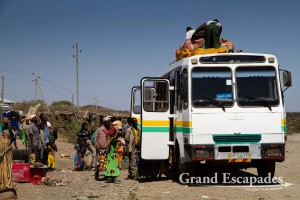Our senses sharpened after a while and we identified Afdera as what it is. A shantytown that exists for one reason only: to host the many businesses and migrant workers that flocked here recently to earn money in the salt industry. Lake Afdera is the second largest lake with salt water in the Afar region.
A short swim in the emerald coloured lake seemed appropriate and felt like swimming in the Dead Sea. Naturally we tried to get the salty crust of our skin and for the split of a second we considered the little fresh water creek that empties in the lake. To no avail, its water was boiling hot!
Here we enjoyed our first cold drink after a week, which made this crummy frontier town seem like the whole wide world. This impression was enhanced by truckers from Djibouti who were guzzling down beer by the crate, a blasting TV playing a violent Jean-Claude Van Damme movie and a modest prostitute that hung out with the guys.
Liza recommended goat, but was told that they had not killed one that day because it was a fasting day. That very moment a little goat came running from the kitchen and frolicked in the makeshift restaurant. At the sight of this cute creature, we were glad that the owner was such a religious man. Besides, we much more preferred the alternative, a giant dish of spaghetti.
Ironically, Ethiopia’s best road runs from this horrid place to the junction with the Djibouti road. For incredible 190 kilometers, it passes lava fields and deserted areas without any visible human settlement. It was built by the Chinese – surprise, surprise – to bring the salt to Addis Abeba or to the harbour of Djibouti.
Racing along the curves we spotted little mounds of stones on top of the surrounding hills. These were traditional Afar tombs for those killed by others. No villages or even huts could be seen from the road, only a few herds of goats under the watchful eyes of skinny children. Once we reached the Djibouti Road, traffic became heavy with hopelessly overloaded trucks. Numerous trucks lay in the ditches and torn pieces of tyre were all over the place.
In the small town of Logia, Christos and Liza had booked the best hotel in town, so they said. Only when we saw a brand new jeep from the United Nation and its driver checking in, we finally believed it. The ladies all decided against the small, stuffy rooms and slept in beds outside. Very, very basic sanitary facilities were hidden in a corner of the yard!
The further away we moved from Afar territory the more talkative Gibril, our cook, became. Only now he felt relaxed enough to tell us about his experiences with the Afar people, who do not think very highly of the Oromo, the ethnic group he belongs to. The Afar would boss him around or ask him to cook for them. Gibril took his own revenge and told his favourite story over and over again. Once he had cooked oatmeal to feed the Afar, which they scoped up with their bare hands. Gibril who had been working with American missionaries for decades, was just shaking his head in disbelief at what he considered uncivilised behaviour.


No comments yet.